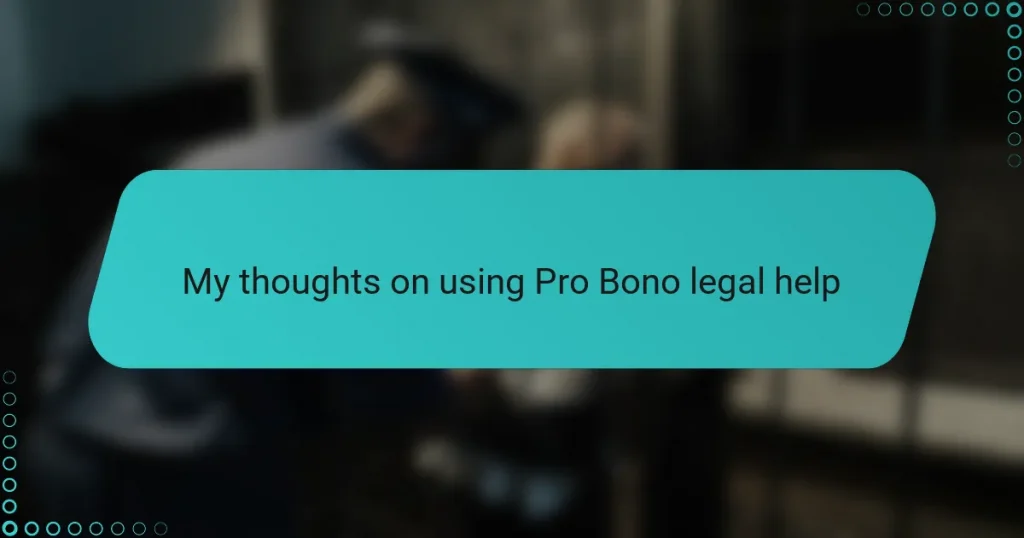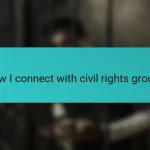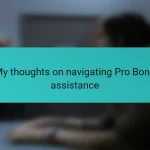Key takeaways
- Pro bono legal help provides essential support to those who cannot afford legal representation, empowering clients and fostering community trust.
- Finding pro bono lawyers can be made easier by contacting local legal aid organizations or bar associations, as well as using online resources.
- Preparation for consultations, including organizing documents and articulating legal concerns, helps maximize the effectiveness of pro bono assistance.
- Challenges such as high demand and limitations on case types highlight the importance of balancing the passion of volunteers with the need for sustainable support.
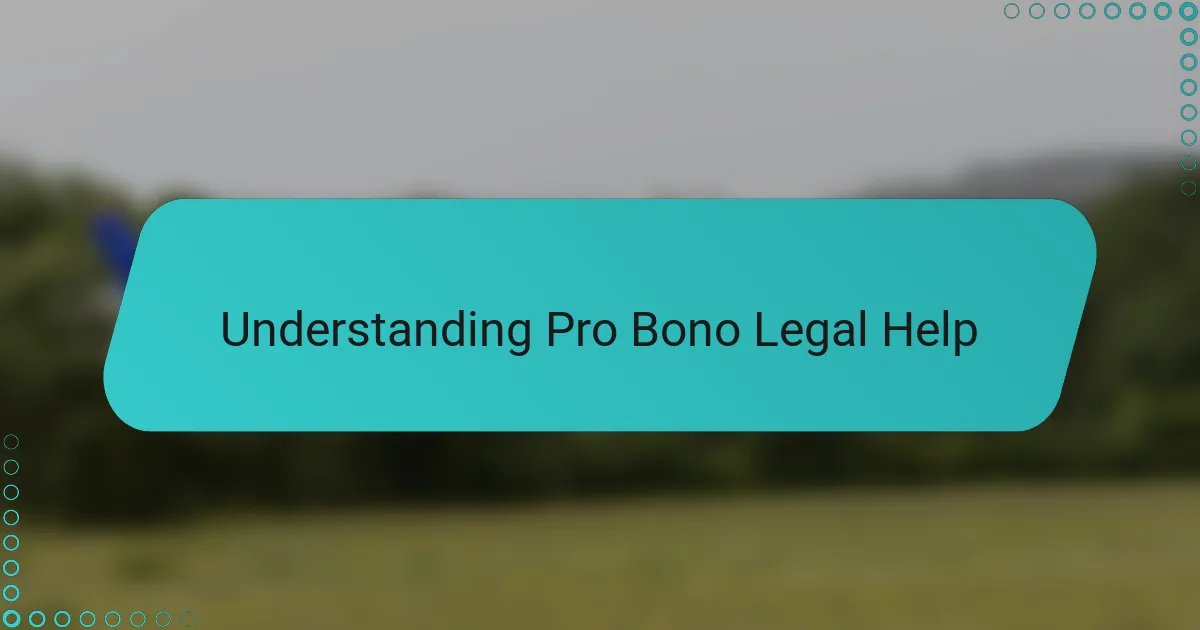
Understanding Pro Bono Legal Help
Pro bono legal help means lawyers offer their services for free or at a very reduced cost to those who can’t afford legal representation. When I first learned about this, it struck me how crucial it is—not just as charity, but as a way to balance access to justice. Have you ever thought about how many people might face serious legal battles without any support at all?
From my experience, pro bono work is more than just a professional duty; it’s a meaningful way for attorneys to connect with communities that often feel overlooked. It’s powerful to witness how a simple act of free legal advice can change someone’s whole outlook, sometimes even saving a family from losing their home or helping a survivor find protection. The emotional impact on both the client and lawyer is profound.
But how do lawyers decide who gets this help? I’ve seen organizations carefully screen cases to ensure resources go where they matter most, which makes me appreciate the system’s thoughtful nature despite its challenges. This process highlights just how valuable pro bono legal assistance truly is for people stuck in difficult circumstances.
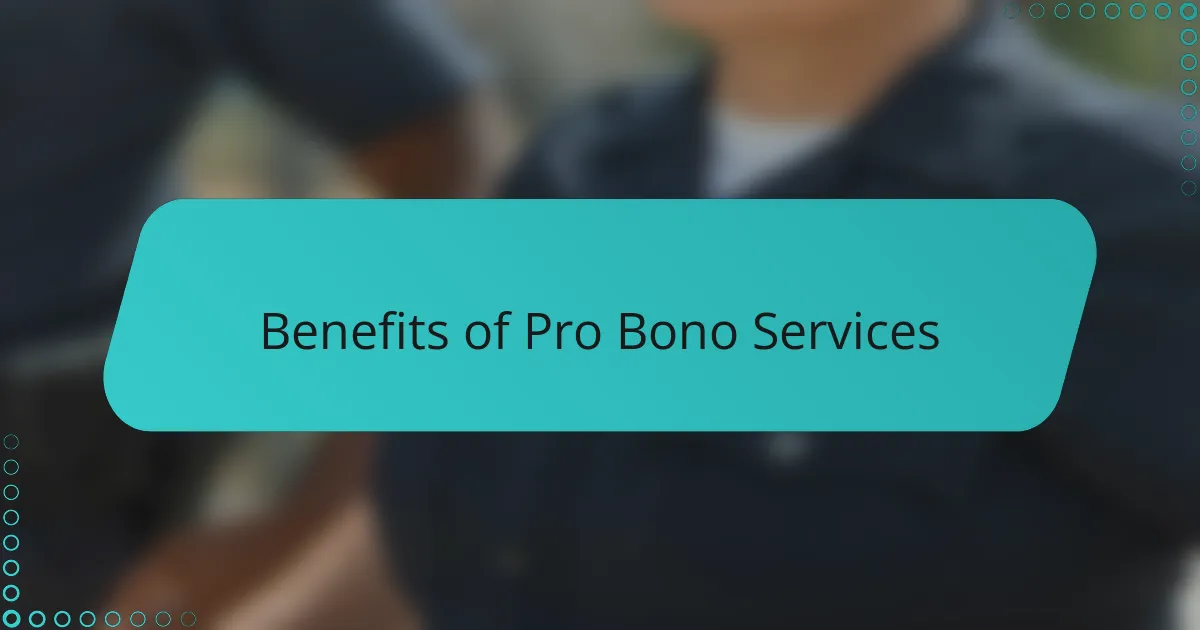
Benefits of Pro Bono Services
One of the biggest benefits I’ve noticed with pro bono services is how they level the playing field. It’s incredible to see someone who might otherwise feel powerless suddenly gain confidence because they have a knowledgeable ally. Have you ever watched a client light up when they realize they’re not alone in their fight? That feeling of empowerment is something money simply can’t buy.
Another aspect that stands out to me is the breadth of issues pro bono work covers. From housing disputes to immigration cases, these services reach people who would often slip through the cracks of the legal system. Knowing that there’s a safety net in place for those moments when legal help seems out of reach makes me believe in the justice system a little more.
What I find most rewarding is how pro bono work builds trust within communities. When someone receives free legal representation, it can spark hope and a sense of fairness that resonates far beyond the courtroom. It’s a reminder that justice isn’t just an abstract idea—it’s something we can actively create together.
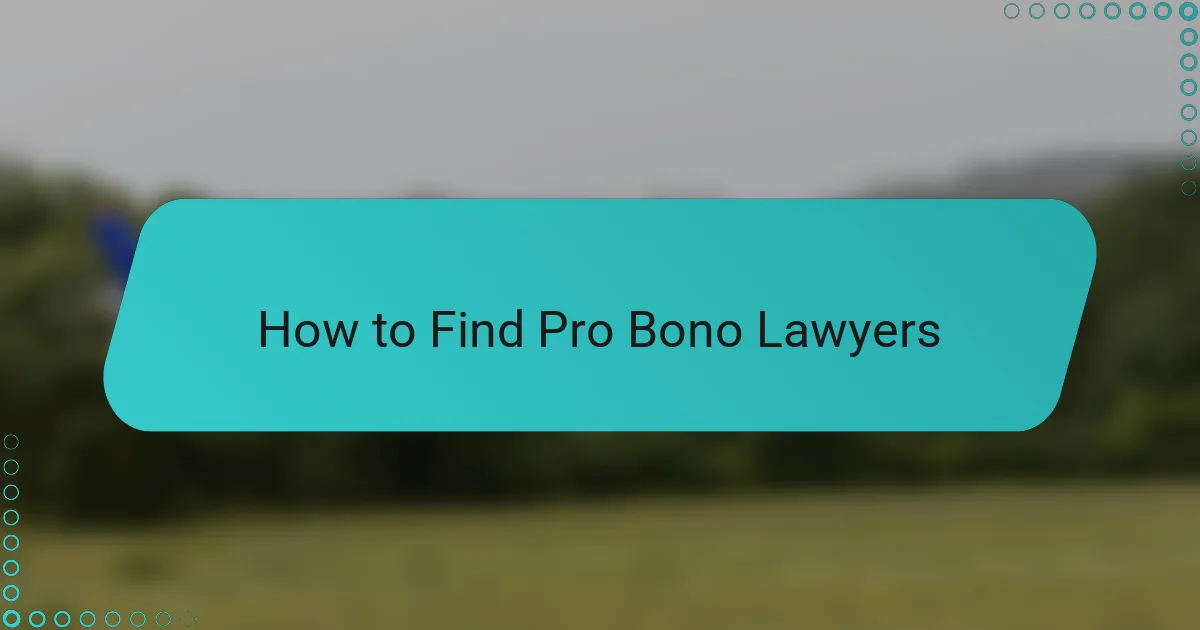
How to Find Pro Bono Lawyers
Finding a pro bono lawyer might seem daunting at first, but there are actually many organized resources ready to help you connect with one. I remember when a client reached out overwhelmed, unsure where to start, and directing them to their local bar association’s pro bono program made all the difference. Have you tried contacting community legal aid organizations? They often have lists of attorneys volunteering their time.
In my experience, some nonprofits specialize in specific legal areas, like housing or immigration, and partnering with them can fast-track finding the right pro bono help. It’s almost like having a guide through a maze—you don’t have to navigate the system alone. Have you considered online databases or legal clinics that offer free consultations? These platforms often provide accessible ways to ask questions and get immediate referrals.
Sometimes, the best step is simply reaching out and asking. Lawyers who take on pro bono cases are usually passionate about justice and want to make an impact. I’ve seen volunteers take on cases that seemed impossible at first, just because someone believed in them enough to make that initial call. So, what’s stopping you from exploring these options today?
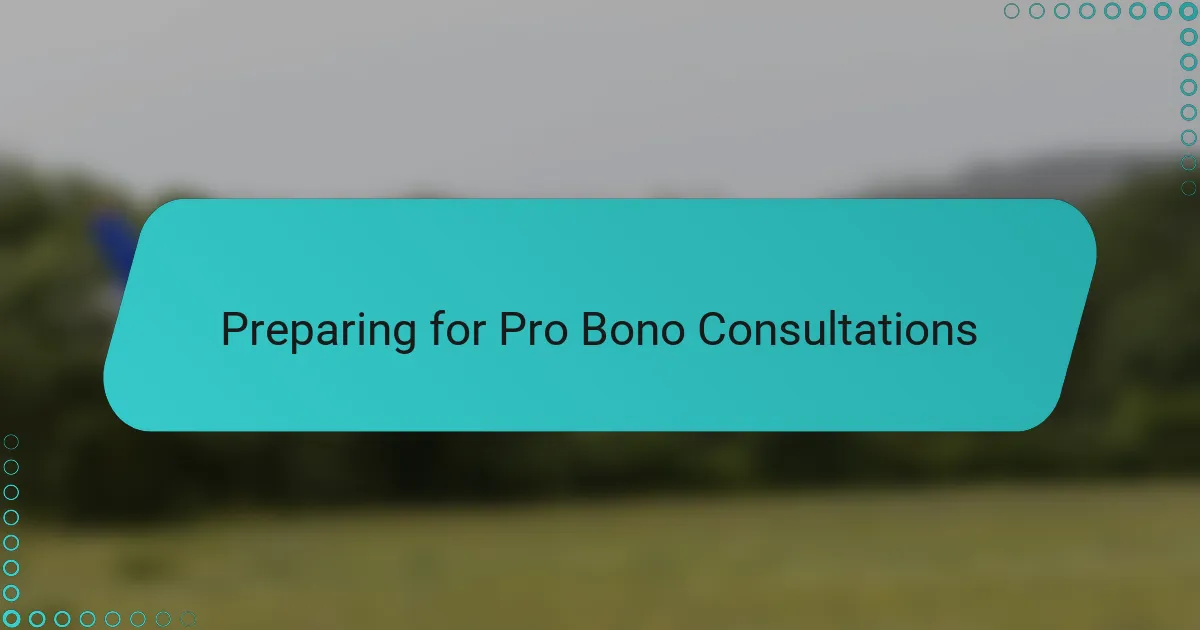
Preparing for Pro Bono Consultations
Preparing for a pro bono consultation means knowing your story and organizing your documents, which can make a huge difference in how effectively the lawyer can help you. I remember guiding a client who brought a folder full of relevant papers—seeing their preparedness made it easier to focus on the core issues rather than scrambling for details.
Have you ever wondered what questions to ask during these consultations? From my experience, writing down your legal concerns and goals beforehand helps keep the conversation on track and ensures you don’t forget to mention something important. It’s a small step, but it empowers you to take control of the process.
Also, be ready to share as much background as you can, even details that might seem unrelated. I’ve found that sometimes the little facts reveal key points that shape the whole case. Being open and honest with your pro bono lawyer builds trust and makes every minute of your free consultation count.
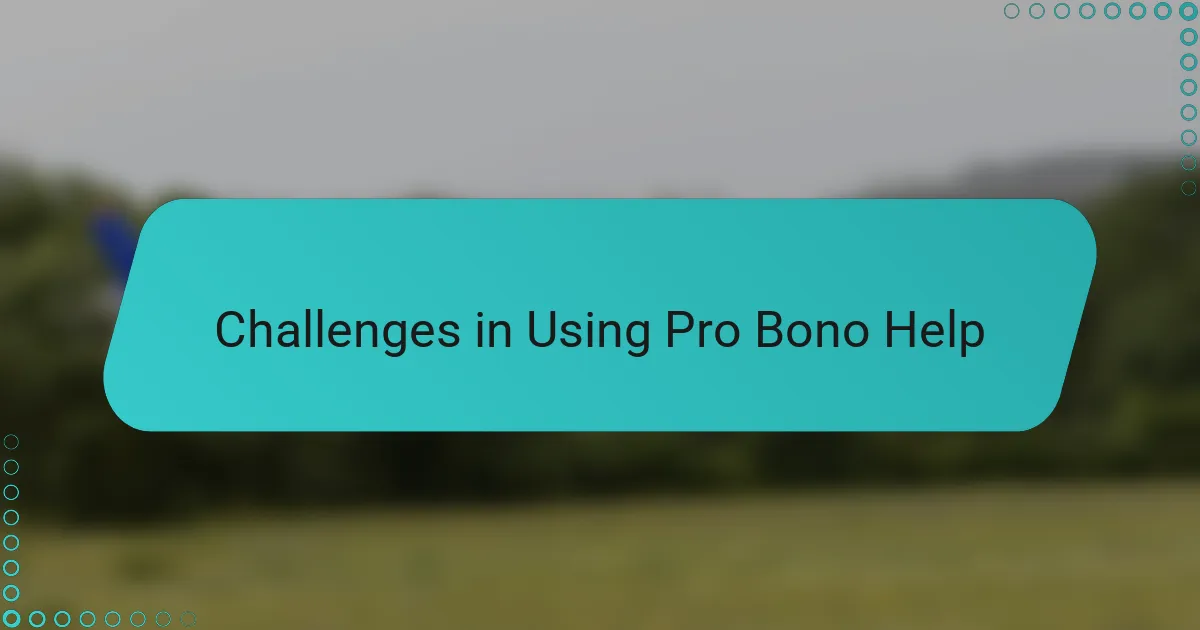
Challenges in Using Pro Bono Help
One challenge I’ve noticed with pro bono legal help is the sheer demand versus limited availability. It’s hard not to feel frustrated when someone genuinely needs assistance but has to wait because the resources are stretched thin. Have you ever experienced that waiting game, hoping for a volunteer lawyer while facing urgent legal issues?
Another difficulty is that pro bono services sometimes focus on specific case types or client profiles. This can leave people with complex or less common legal needs in a tough spot, wondering if they’ll find anyone who can help. From what I’ve seen, this limitation can create a sense of disappointment, especially when someone expects a broad safety net and finds gaps instead.
Lastly, I’ve witnessed how emotional strain can impact both clients and pro bono lawyers. When lawyers juggle heavy caseloads alongside their paid work, the risk of burnout rises. It makes me think about how important it is to balance passion with practical support, so these vital services remain sustainable for everyone involved. Have you ever wondered how volunteers cope with such pressure?
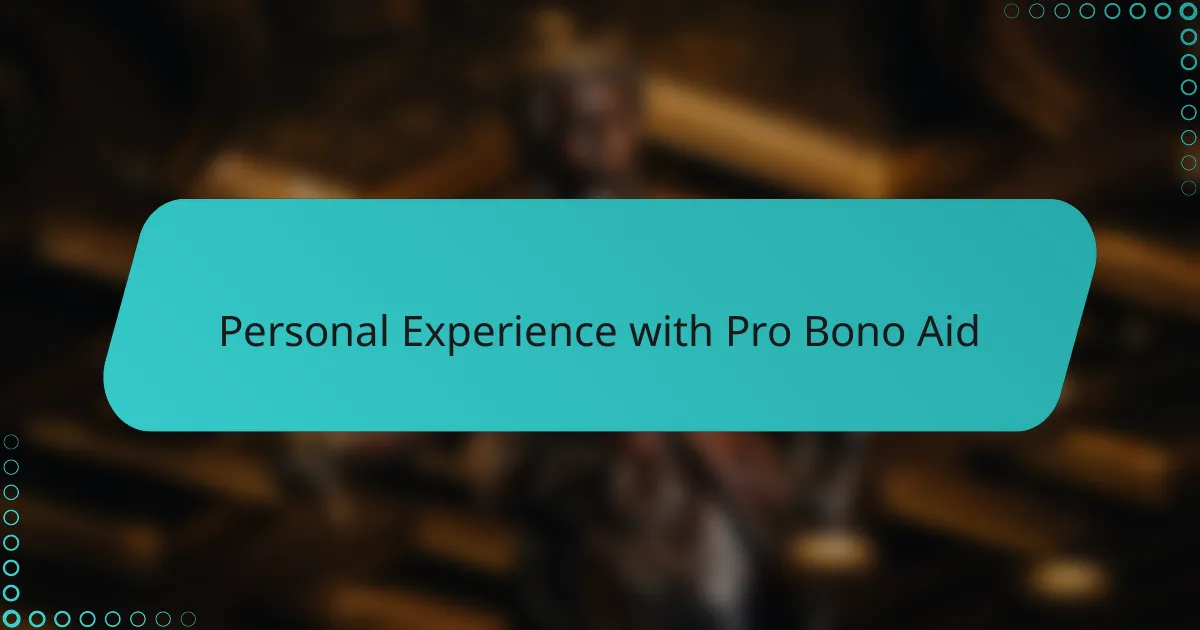
Personal Experience with Pro Bono Aid
When I first sought pro bono legal help, I felt a mix of relief and anxiety. I remember vividly how the lawyer’s genuine attention made me realize I wasn’t just another case number; there was someone truly invested in my struggle. Have you ever been in a situation where just being heard gave you enough strength to keep going? That’s exactly what happened to me.
What struck me most about my experience was how approachable and patient the pro bono lawyer was. Despite the complexity of my issue, their calm reassurance helped me untangle the mess step by step. It made me think about how critical empathy is in legal advocacy—not just expertise, but real human connection.
Of course, it wasn’t all smooth sailing; there were moments when I had to wait for responses or clarify details repeatedly, which tested my patience. But each small breakthrough reminded me why seeking free legal help was worth the effort. Have you ever noticed how perseverance often opens doors that seem firmly shut at first? Pro bono aid taught me that lesson firsthand.
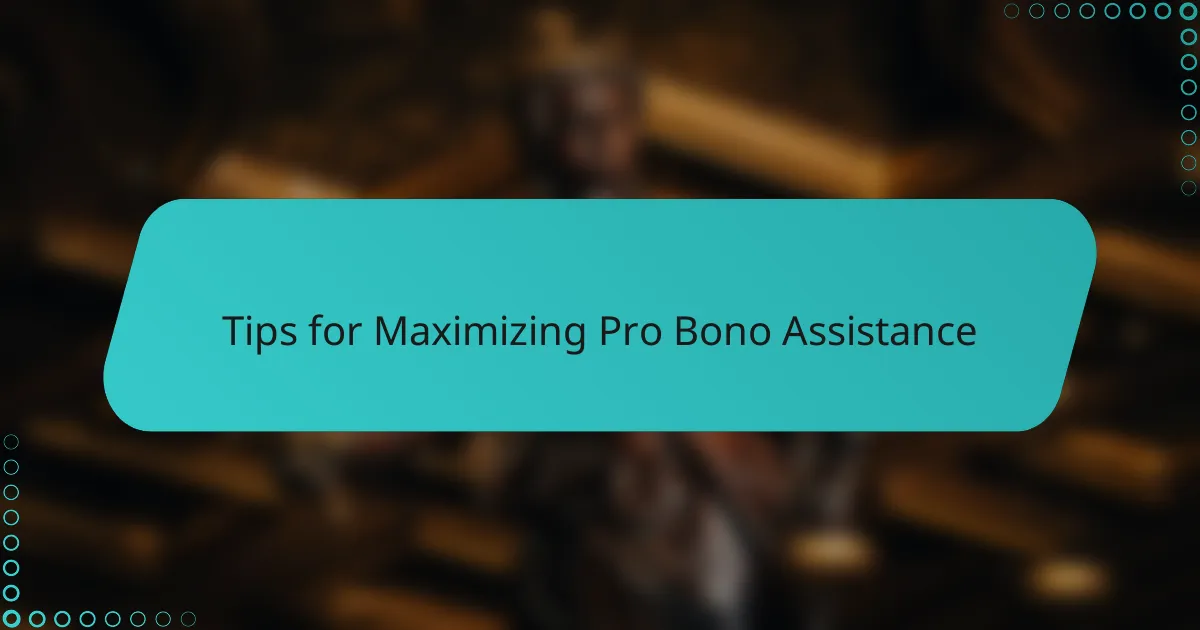
Tips for Maximizing Pro Bono Assistance
One thing I’ve learned is that clear communication can make a huge difference when working with pro bono lawyers. I’ve seen clients who came prepared with concise questions and organized documents get deeper, more focused help in less time. Have you ever noticed how being organized not only shows respect for the lawyer’s time but also helps your case unfold more smoothly?
Another tip is to be patient yet proactive. From my experience, follow-up emails or calls—even brief ones—remind busy volunteers that your case matters. I remember a client who gently checked in after a meeting and was surprised by how much it helped them stay on the lawyer’s radar. Isn’t it encouraging to realize that a little persistence can keep momentum going?
Lastly, don’t hesitate to express your goals and concerns openly. I’ve found that pro bono lawyers appreciate honesty because it lets them tailor their advice to what truly matters to you. When you share your story fully, even the small details, you create a partnership that feels more personal and effective. Have you ever felt that kind of genuine collaboration with someone willing to invest their time in your cause?
